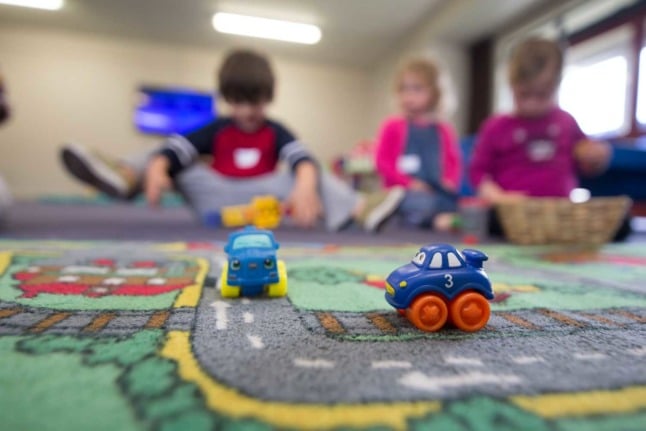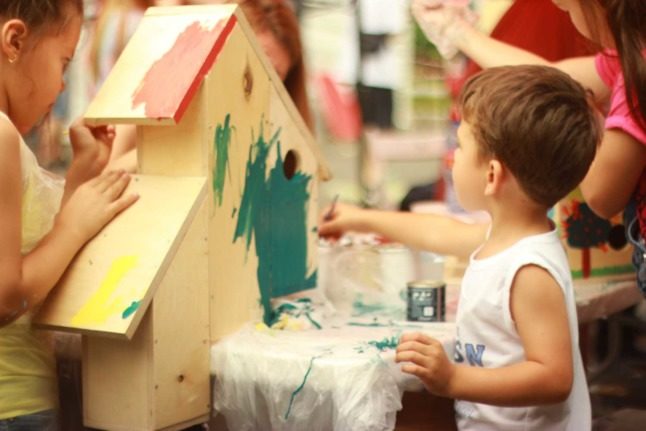The high costs of childcare are a frequent complaint of many a parent in Switzerland.
While this of course varies dramatically from canton to canton, the average cost of a day of childcare in Switzerland is CHF130.
The average Swiss family spends a massive 41 percent of their net income on childcare, three times the OECD average of 13 percent.
When paired with the cost of having children in Switzerland, it’s enough to make someone decide against having kids – or maybe leaving Switzerland altogether.
READ MORE: How much does it cost to raise a child in Switzerland?
But if you’ve decided to have kids and remain, then you’ll probably have to face childcare costs at some point.
Tax
Keep in mind with all of these tips that you are able to deduct childcare costs from your tax in Switzerland.
This includes most forms of childcare, including for instance the costs of a private nanny.
In order to do so, you need to provide proof of payment when lodging your tax return.
Parents can deduct a maximum of 10,100 francs per child per year (federal tax), according to Swiss finance comparison site Comparis.
More information about how to deduct childcare costs from your tax can be found at the following link.
EXPLAINED: What can I deduct from my tax bill in Switzerland?

Second hand
One of the silver linings to Switzerland’s wealth is that it has a lot of wealthy people, who seem not to mind how much things cost.
As a consequence, there are often great deals on second-hand stuff for kids.
If you send your kid to a creche, they may ask you to provide a range of different things like clothes, umbrellas and other weather equipment and small nap mats or even a basic crib.
VERDICT: How to save money when raising children in Switzerland
Obviously this stuff is expensive, particularly if you’ve already bought it for home.
Remember in this case that eBay is your friend, while you can also check notice boards at the childcare facility itself to see if other parents have stuff to give away.
One inside tip is to change the postcode in your eBay search to a wealthier one, thereby improving your chances of finding a bargain.
Subsidies
When you learn that parents in Switzerland often spend 130 francs a day per child for childcare, you might feel like it’s time for a career change.
But due to the aforementioned tax breaks and subsidies paid out in the cantons, many parents will pay between 30 and 80 percent of this cost.
It is difficult to provide a nationwide overview due to the fact that things differ from canton to canton, but all cantons offer some form of subsidy for childcare costs depending on your income.

Be warned though that subsidies will be determined on the basis of both parents’ income, with two parents both earning an average income often not qualifying for subsidies in some cantons.
The amount you pay will be based on last year’s tax figure.
Cantons will often provide assistance in working out whether you qualify for a subsidy and how much it will be.
In Zurich for instance, if you earn 80,000 per year, you will be liable for around 70 francs per day.
Here is the calculator for Zurich.
While the differences from canton to canton may be confusing, the fact that there are 26 different sets of rules can actually work out in your favour.
For instance, some cantons have introduced more competitive subsidy systems recently in order to attract workers (and their taxes).
This is of course something you should think about when choosing where to live, with many Swiss workers choosing to live in a different canton to the one they work in for various reasons including cost, quality of life and amount of living space.
Take time off
Of course, less childcare is always going to be cheaper – so if you can work out a solution where you or your partner takes care of the kids for some of the time, then you’ll already be saving (other than of course the lost wages).
After birth, Switzerland has a moderate parental leave scheme, but the conditions offered by private companies are often better.
Keep in mind that your child will be able to attend pre-school or kindergarten from around four years of age. While pre-school is not compulsory, around 99 percent of Swiss kids attend it.
In Switzerland, children can start attending school from around six years of age, with cantons required to offer at least one year of pre-school education.
This does of course depend on the canton, with some offering two years and Ticino offering three.
If you can take advantage of flexible work, then you might be able to take a couple of years off to take care of the kids and go back to work when your kid hits pre-school age.
You can also bite the bullet and call up the grandparents, if of course they live in Switzerland. You’ll have the kids back punctually and with a Swiss dialect in no time.
But if that’s not an option, then you need to consider the different types of childcare.
Childcare options
Probably the most important factor underlying how much you spend on childcare is what kind or kinds of childcare you choose.
While most of us would think of a nursery or a creche as the standard, there are in fact several forms of childcare which are common in Switzerland.
This of course includes nurseries, but also extends to childminders (Tagesmütter or mamans de jour), babysitters, au pairs and private nannies.

What are the differences between the types of childcare in Switzerland?
Each of these types differ in terms of the type of care provided and of course the cost. There are two broad types: in-home care and external care.
In-home care
The most expensive is likely to be private nannies, which will cost between CHF3,500 and CHF5,000 per month, including mandatory pension contributions.
Having a nanny will provide your children with continuity and specialised care.
If you have a particularly demanding work schedule, a nanny is likely to be the most flexible option out there.
There are also other advantages with nannies, for instance helping your kids learn a specific language.
Another in-home option is a babysitter. Adult baby-sitters earn roughly CHF20 per hour, while teenager baby-sitters will be cheaper.
This is a flexible option and one which can suit unpredictable schedules. Babysitters will generally just provide basic care and will not educate the child (nor will they have skills as an educator in most cases).
If you are after the same type of care but a fair bit cheaper, then an au pair is a good option.
This is likely to be a lot cheaper and will cost somewhere around CHF1000 per month, considering the fact they live with you.
Au pairs are given a ‘pocket money’ payment every month which comes in at around 700 Swiss francs (€615) once extra babysitting duties are calculated in.
Au pairs are not allowed to work more than six hours per day or 30 hours per week under Swiss law, which can make things a bit more difficult if you have a busy work schedule.
READ MORE: The pros and cons of being an au pair in Switzerland
Care outside the home
Nurseries and creches are a popular option but they’re likely to be the most expensive after nannies.
These will cost an average of CHF130 per day.
This average figure though is Swiss-wide, meaning that the costs will under CHF100 in some cantons and over CHF150 in others.
In an average year, that will be around 2,700 per month.
This option provides a lot of flexibility, with most opening from 6am until later in the evening.
Your kids will also experience socialising and playing with other kids, which is important for all kinds of psychological and sociological reasons we don’t have time to get into here.
This is also another good option if you want your child to get extra linguistic support, i.e. by learning the Swiss language of the place you live in.
Another option is a licensed childminder. They work from their own home and will feed and take care of relatively small groups of kids.
Licensed childminders will take care of your kids for between CHF1,000 and CHF2,000 per month, depending of course on the canton and other factors.
Each canton will have information about how to find a childminder. Here’s a list of possibilities in Zurich.



 Please whitelist us to continue reading.
Please whitelist us to continue reading.
Member comments